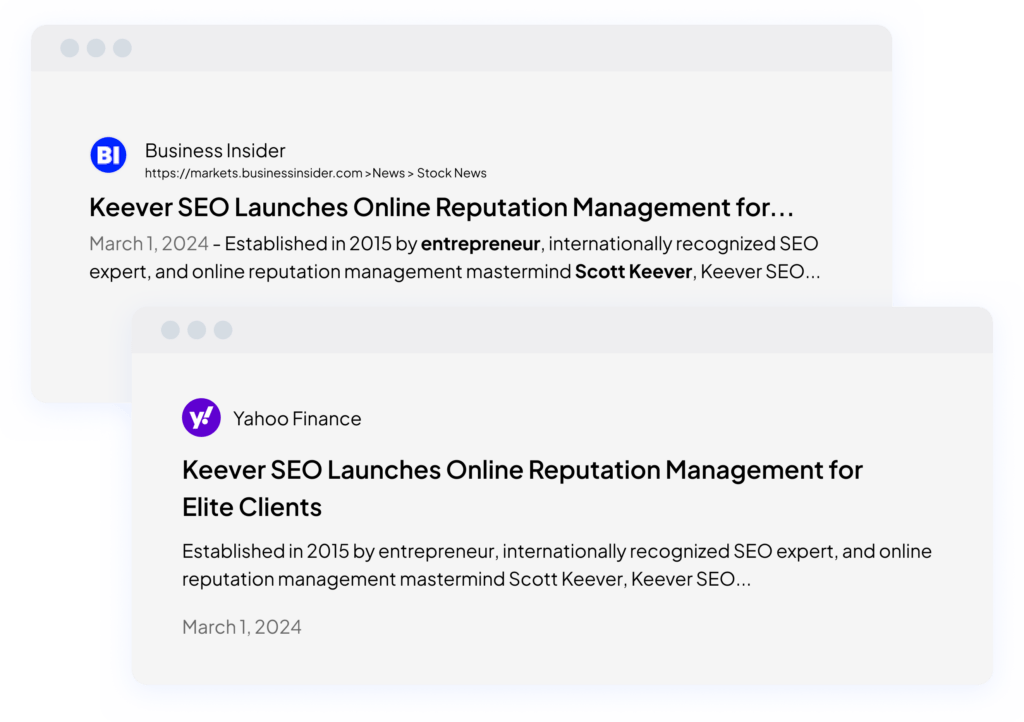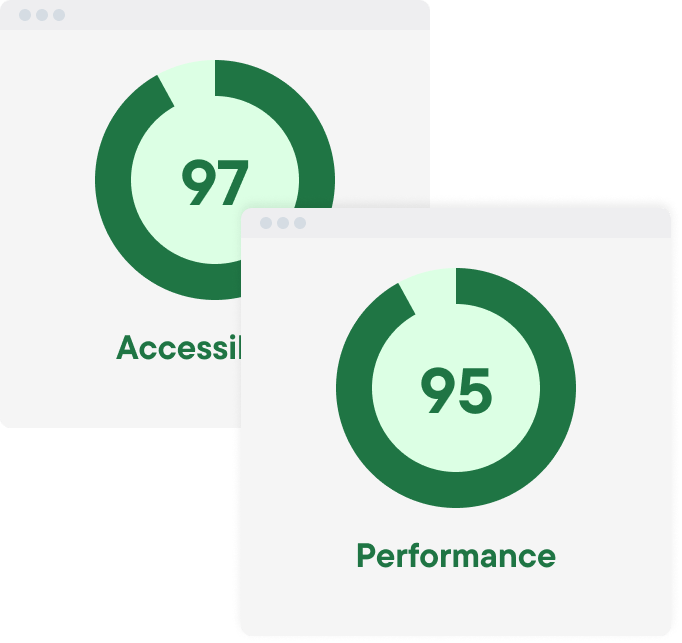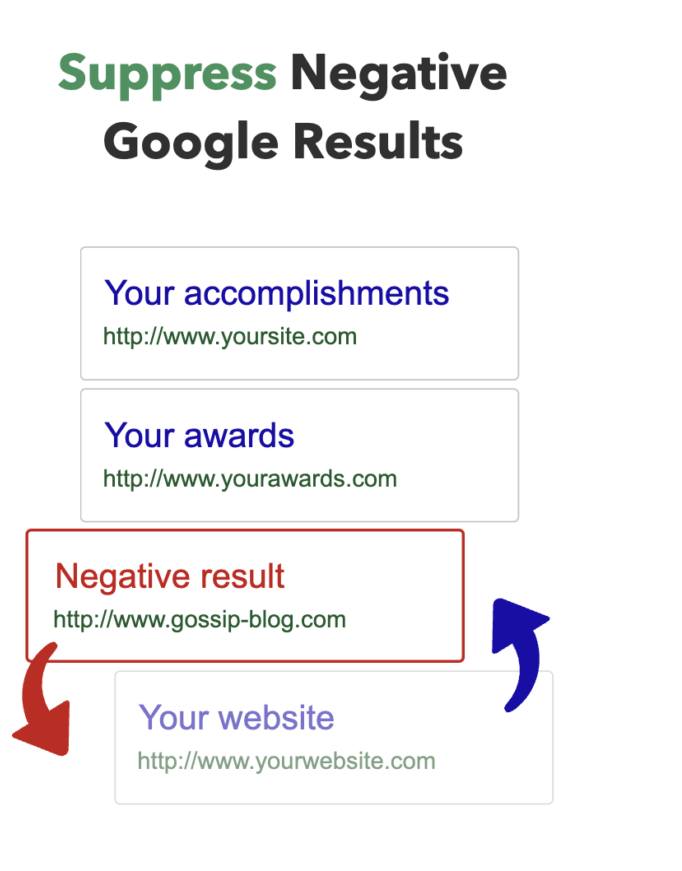Never Worry About Negative Content Again with Our Online Reputation Management Services
- Take Control of Your Online Reputation
- Bury The Negative, Promote the Positive
- We Make Page 1 Full of Positive Content
How We Make You Look Good Online
Generate Trust With Business Online Reputation Management
- Bury Negative Press, and Promote the Positive
- Improve your brands trust and credibility
- Develop a visible and authoritative Page 1 of Google for your Brand
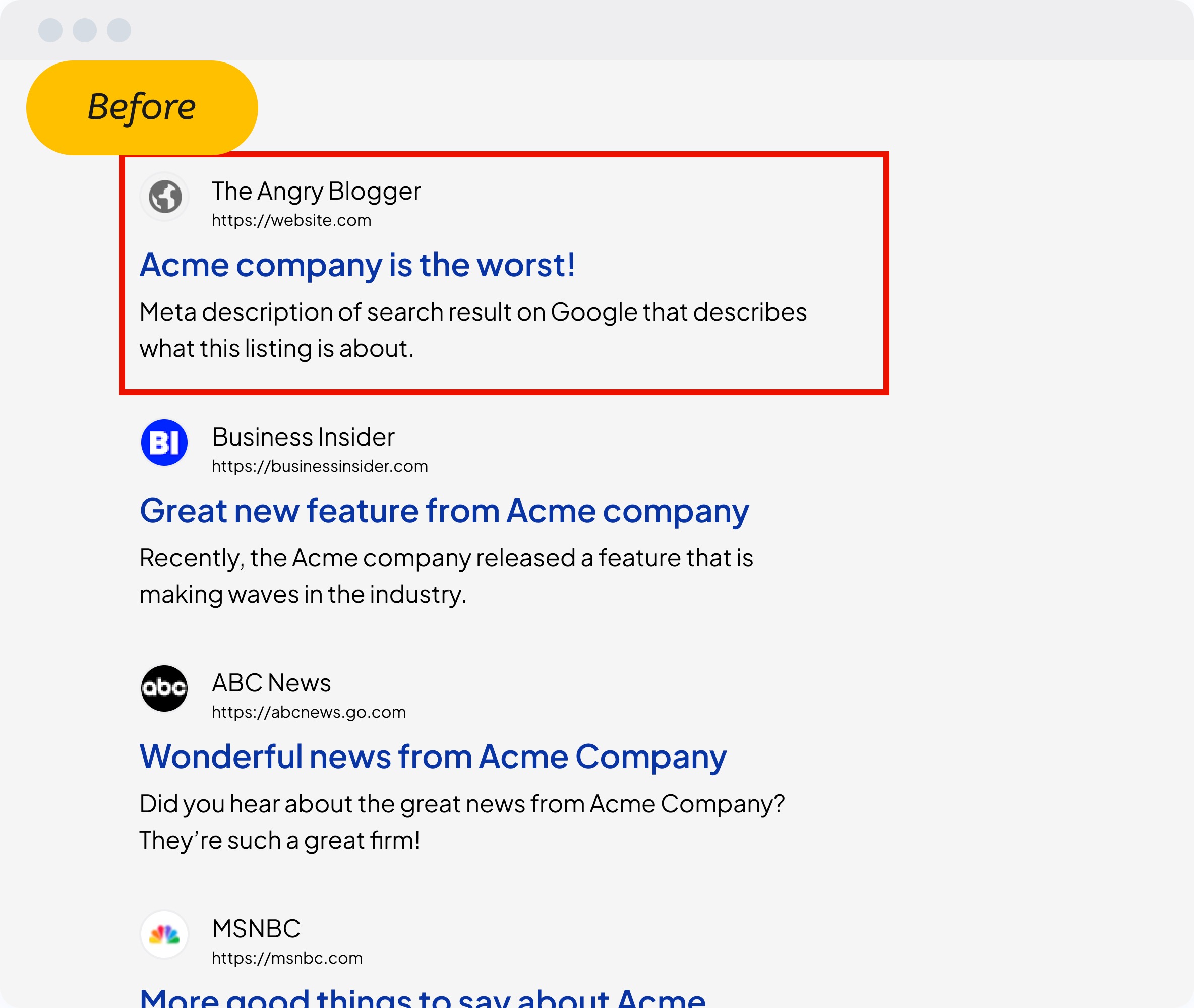
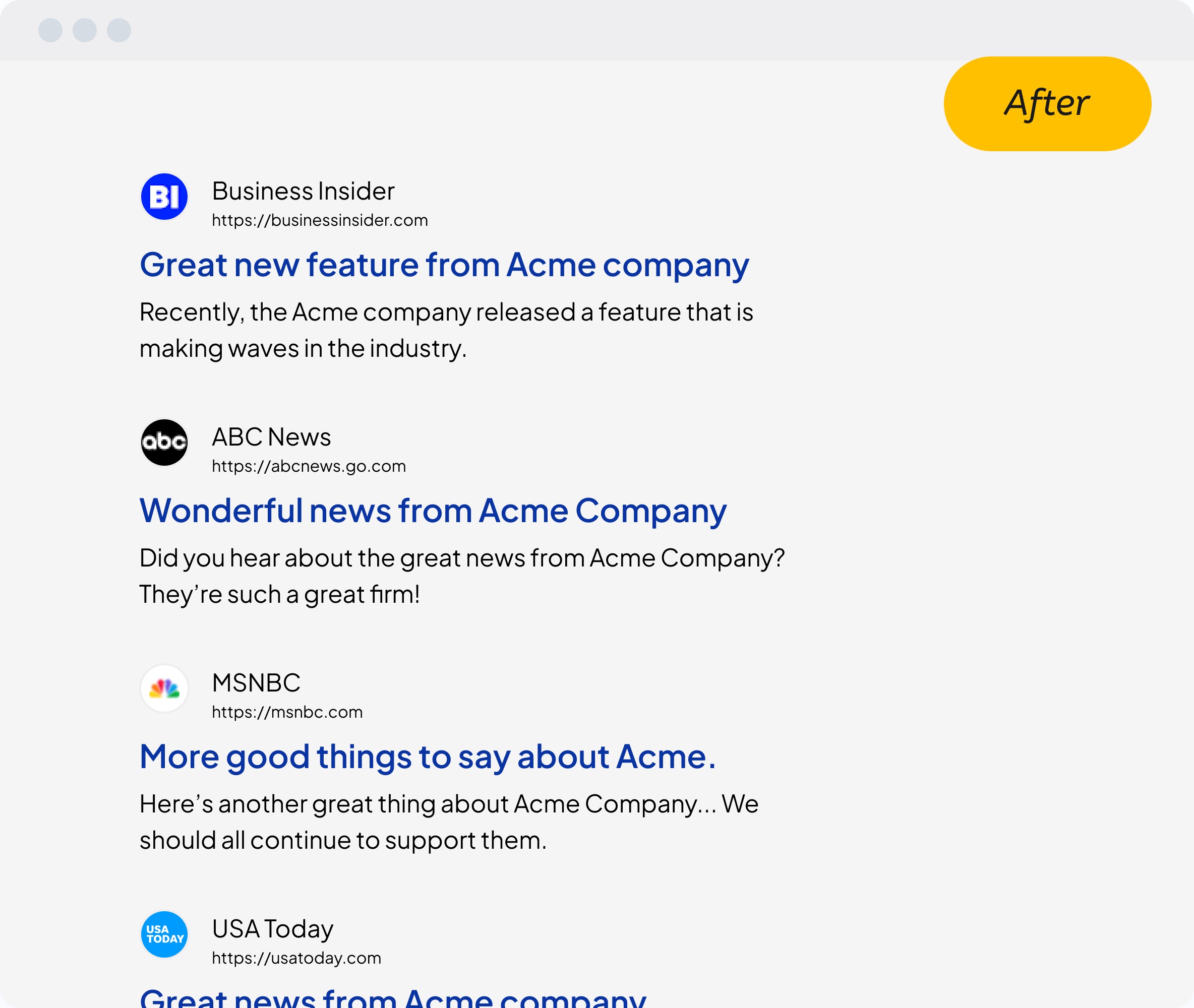
Repair and Protect Your Personal Brand With Online Reputation Management
- Bury Negative Press, and Promote the Positive
- Improve your personal brands trust and credibility
- Develop a visible and authoritative Page 1 of Google for your Personal Brand
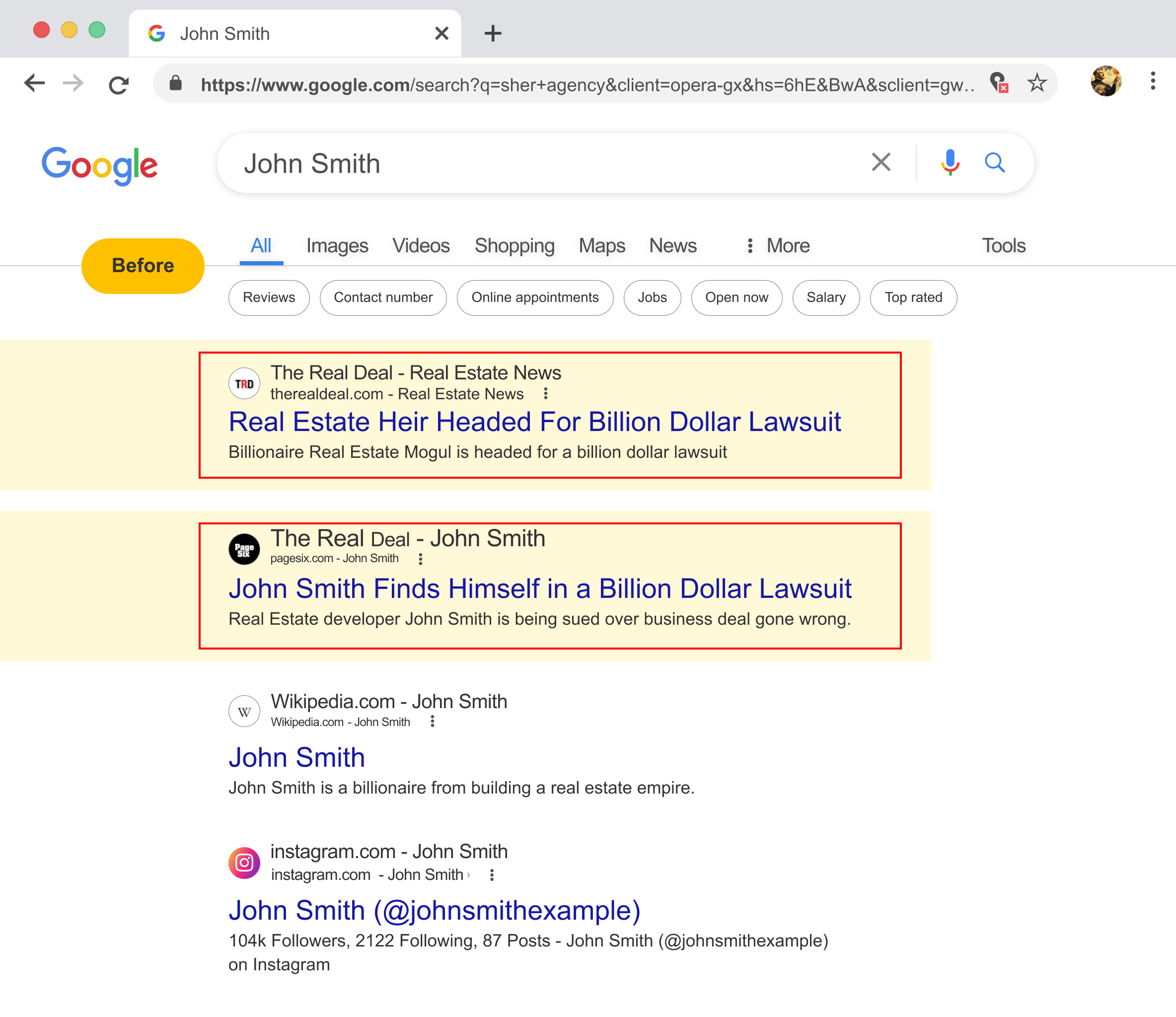
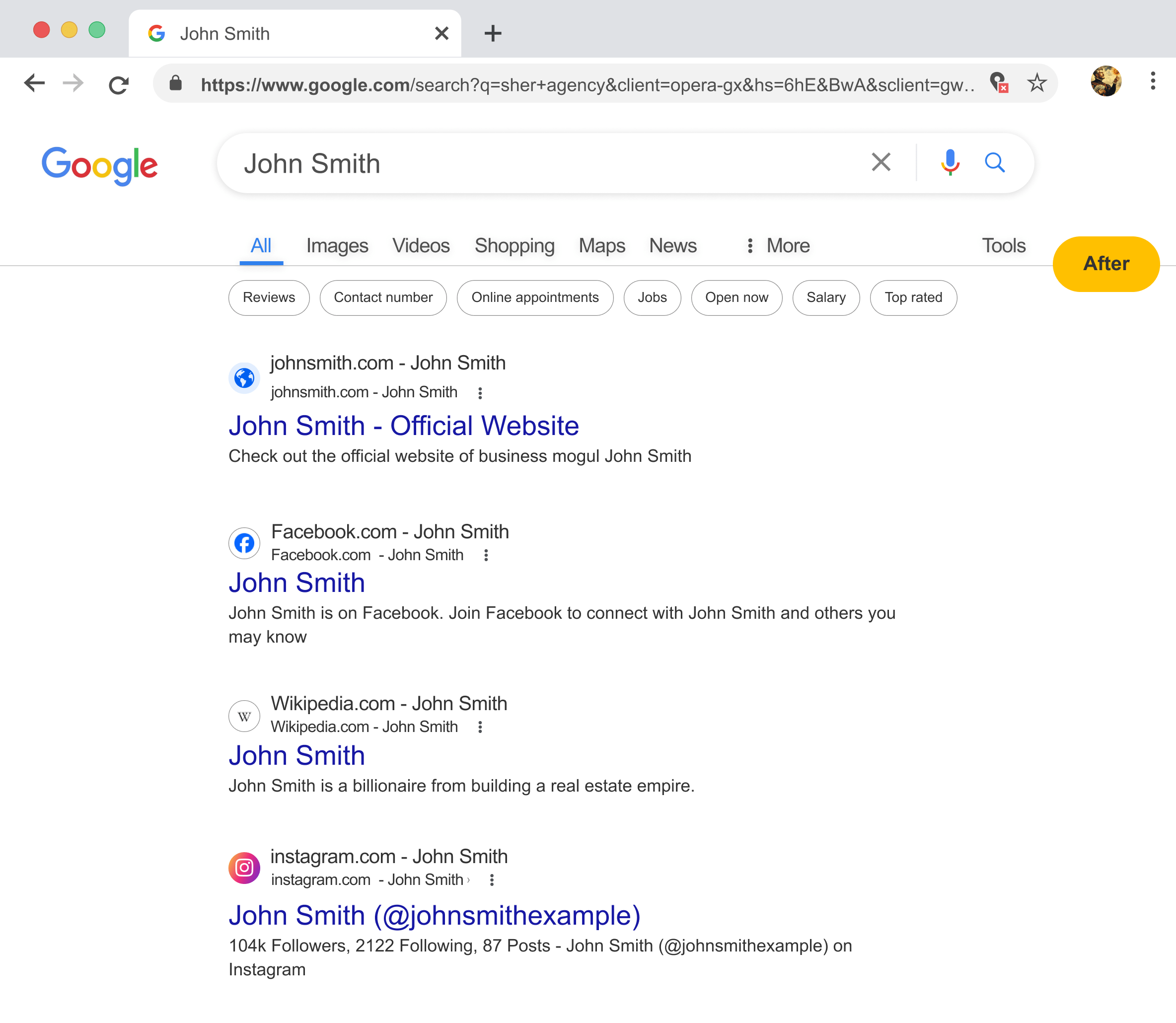
If You Reputation is Under Attack it’s Time To Fight Back with Online Reputation Management
- Bury Negative Press, and Promote the Positive
- Improve your brands trust and credibility
- Develop a visible and authoritative Page 1 of Google for your Brand
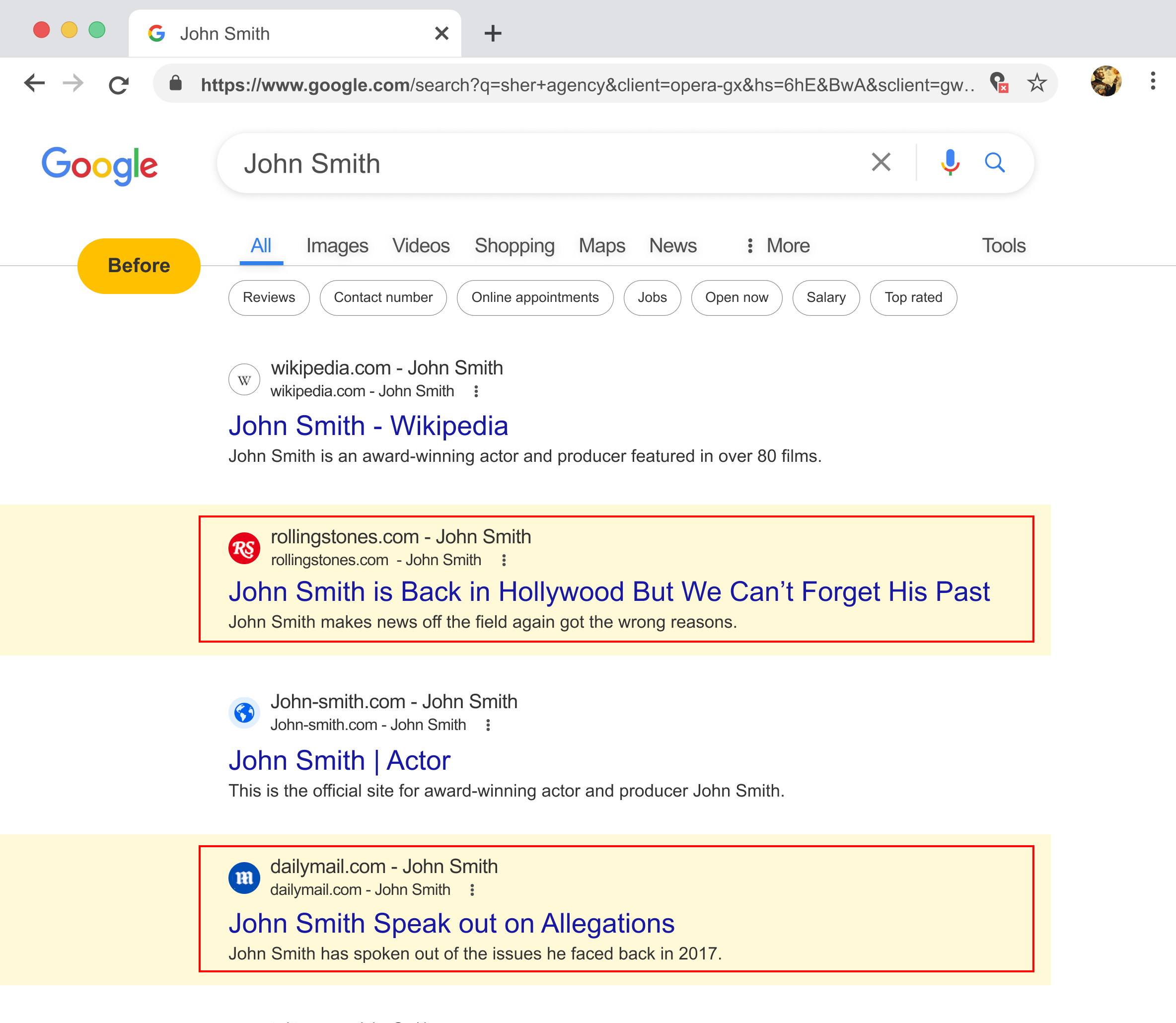
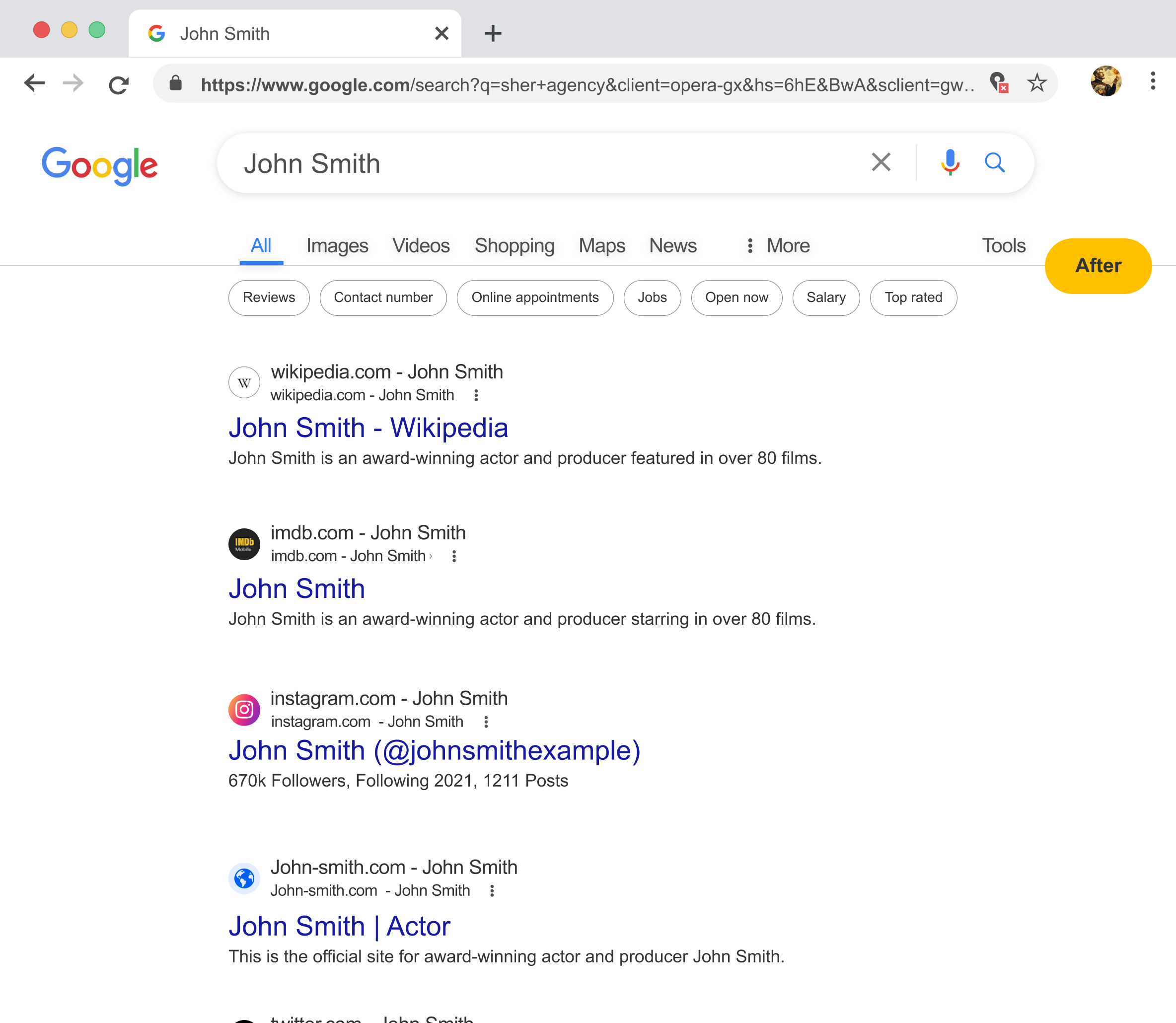
Your First 30 Days With Keever SEO
Audit Your Online Reputation
We conduct an extensive audit to identify all negative content and the search term variations they rank for.
Establish an ORM Strategy
We craft a customized approach designed specifically for you to mitigate negative publicity and amplify positive media coverage.
Identify Existing Positive Entities
We’ll assess your existing search results to identify positive entities with sufficient authority for integration into our campaign strategy.
Postive Content Creation
We will start developing key assets to boost our campaign. These include a personal website, securing unclaimed social media profiles, issuing press releases, creating scholarship sites, and obtaining features in high-authority news outlets.
SEO Optimization
We will launch a monthly SEO campaign focused on optimizing both new and existing positive assets to outrank negative press. Given that 75% of users never scroll past the first page of Google search results, our primary objective is to ensure that our positive assets dominate the first page, effectively displacing any negative content.
Monitor and Protect
Upon successfully cleaning up the first page of search results, we will continue to strengthen these positive assets to prevent any negative content from outranking them in the future. Additionally, we will persist in pushing down the negative articles as far as desired within the search results.
Your First 30 Days With Keever SEO
What Goes Into an Effective ORM Campaign?
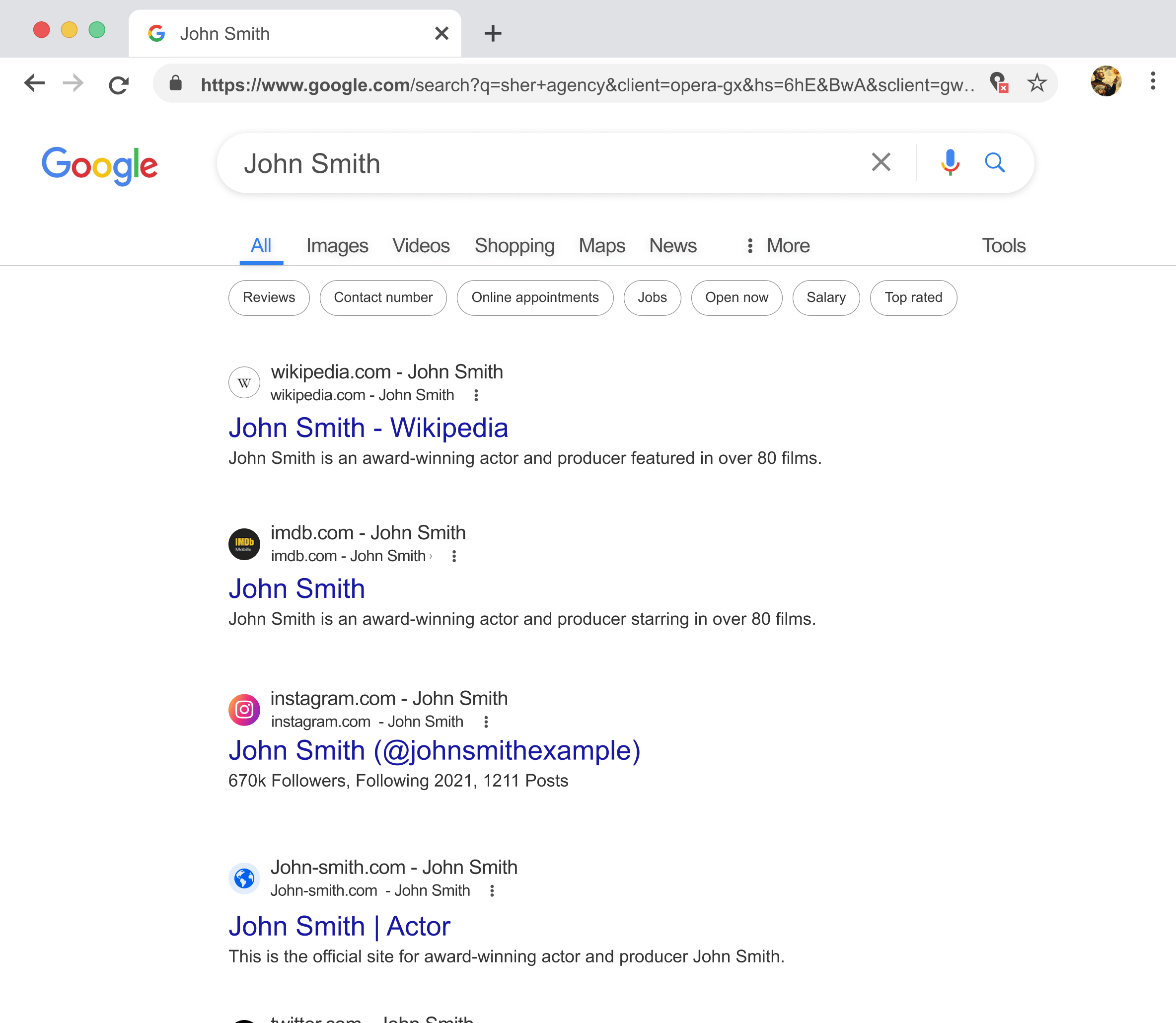
Why Our Clients Love
Working With Us
Build a Positive Reputation
Control Your Search Results
Protect Your Reputation
Why Our Clients Love
Working With Us
We drive sales, visibility, and exposure
Transparent, detailed reporting
Average client response time in 5 minutes or less
- No Contracts Required
- Successfully Helped 100s of Clients
- 100% Discreet & Confidential
What is Online Reputation Management?
- Proactive reputation management: This type of ORM focuses on building a positive image of your brand online to protect you if something bad happens. This includes improving Google results, posting on social media, and staying engaged on review websites like Trustpilot.
- Customer review management: This is when you actively respond to positive and negative reviews to foster trust and build your brand image.
- Reactive reputation management: Reactive reputation management is when someone posts something negative or unfair about you, and you respond by addressing the situation, taking control of the narrative, and publishing mass amounts of positive media to push it out of the spotlight. When done right, the favorable news will overwhelm anything negative and your life and business will get back to normal. Keever SEO specializes in neutralizing negative media about your brand and putting an end to your PR crisis.
Why is Online Reputation Management Important?
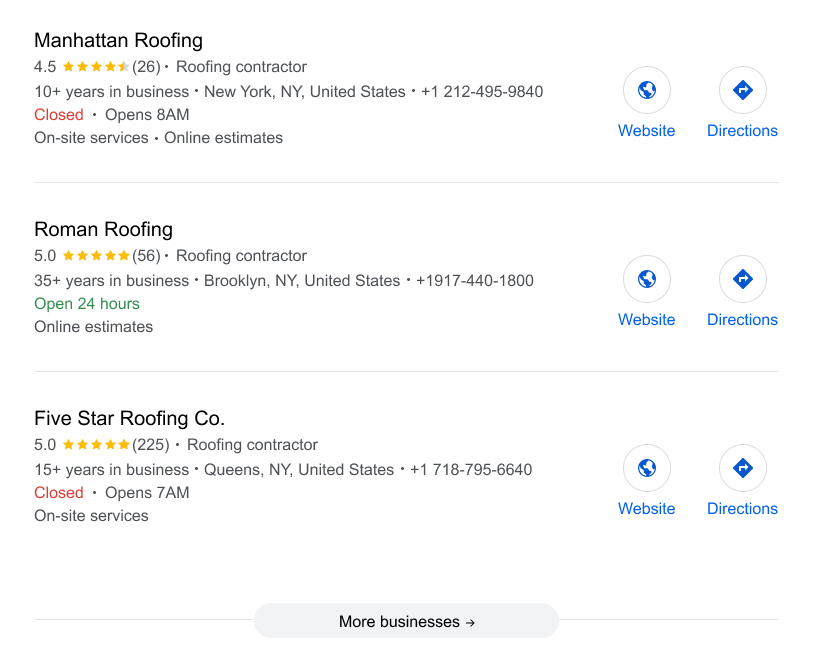
- Improving conversion rates by appearing more trustworthy
- Reducing the chances that negative press gains visibility
- Increasing brand awareness by making you more visible in key places
- Optimizing your business by seeing what customers dislike the most and fixing it
- Lost sales: Customers who search for your brand will almost certainly not do business with you.
- High costs: It’s much easier to proactively build a positive reputation than it is to repair a damaged one. If you’re in the middle of a media storm, it’s a lot of work to climb out.
- Crisis and ruin: Individuals, brands, and Fortune 500 companies have all been ruined by public relations crises (I’ll cover a few down below).
- Difficulty attracting talent: Skilled employees almost always search for potential employers online. If your company is seen as a poor place to work, this could influence their decision.
- Difficulties with sponsors and partners: Other companies will hesitate to do business with a brand or individual with a negative online reputation.
An Example of Online Reputation Management in Action
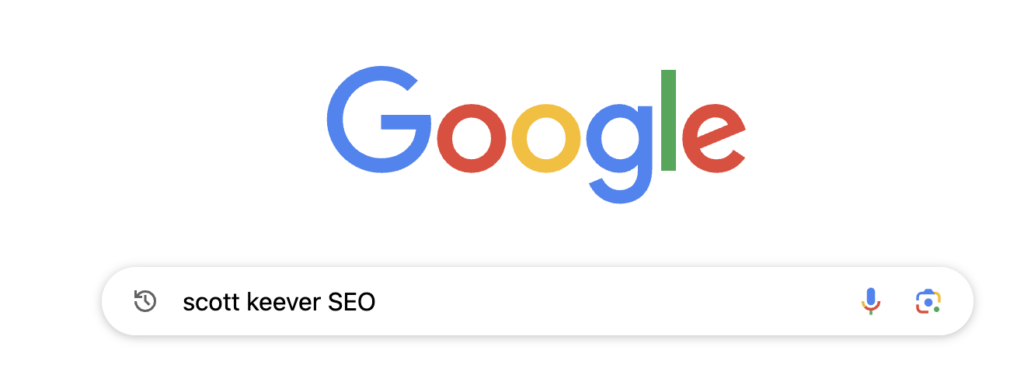
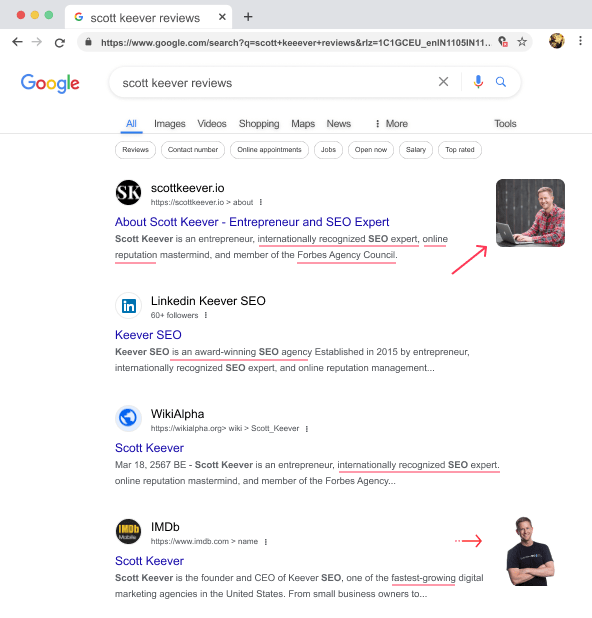
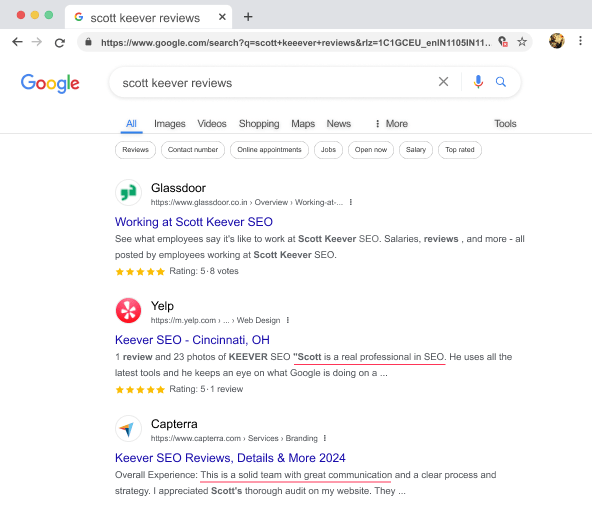
Examples of ORM Failures (And What They Did Wrong)
JPMorgan’s “#AskJPM” Disaster
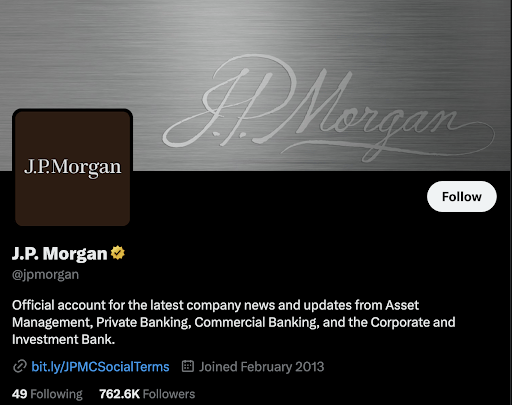
What Went Wrong?
American Airlines Customer Response ORM Failure
What Went Wrong?

Nestlé
What Went Wrong?
How Does Online Reputation Management Work?
- Letting you keep control of the narrative and building a reputation that reflects your brand strengths
- Building a strong fortress around your name that protects you from bad press
- Utilizing the right media channels to connect with your audience
- Strengthening your internet reputation by encouraging customers, journalists, and large websites to publish positive reviews/information about you
- Monitoring and responding to bad press or reviews as quickly as possible, ensuring they do the minimum amount of damage
- Decide what you want your image to be: The first step in solidifying your online reputation is deciding exactly what you want it to be. You want your reputation to be positive. But which points exactly do you want to highlight? Your customer service? Your expertise? The quality of your products? Think back to my personal example. I want to be seen as an SEO and ORM expert. That helps guide me on which assets to build, what to say, and where to publish content.
- Audit Your Online Reputation: Conducting an online reputation audit helps you create a guide for further actions in protecting and enhancing your reputation. During an audit, we analyze public sentiment, create a baseline for your reputation, uncover negative press, and benchmark you against competitors. This includes analyzing the SERP, checking mentions of your brand, coloring customer reviews (what’s their general sentiment?), and seeing where people are discussing your business. We’ll check Google, social media, media sites, and review aggregators. The benefits of an online audit include seeing where your reputation stands, uncovering hidden issues, identifying opportunities for improvement, and preventing crises.
- Develop a Content Strategy: Once we know where your online reputation stands and where we need to promote your brand, the next step is to develop a content strategy that builds positive assets in the right places. This includes guest blogging on major websites, building high-value profiles on the right platforms, improving reviews on major sites, and optimizing existing assets to say what you want them to say. It also includes developing a social media strategy that builds a dedicated following. By the way, social profiles can rank on Google, too. You’d much rather a potential customer find an optimized social profile with positive content than a piece of misinformation or a negative review.
- Publish Content Consistently: Publishing consistent content on the web solidifies your image in Google’s eyes. We will regularly publish consistent content about our client to “train” Google’s algorithm on who you are and what you do. The more positive signals we send to Google, the more it trusts that content over less-consistent harmful content. The result? It ranks positive articles on top, and the negative ones move out of the spotlight.
- Set up Monitoring: The key to success with ORM is being constantly aware of everything that’s said about you or your business online and responding ASAP. We’ll set up monitoring tools like Google Alerts and BuzzSumo to keep our ears to the ground at all times, so we can prevent damage before it even happens.
- Respond to Reviews And Press: You need to respond to reviews and press (and constantly maintain your reputation in general) because customers appreciate it. Timely and empathetic responses to reviews not only help win new business, but they could even get the negative review removed. 53% of customers expect a business to respond to negative reviews in a week or less, according to TrustPulse’s study entitled “Online Review Statistics”.
The Best Online Reputation Management Media Channels
Paid Media (Ads, Sponsored Posts, And Influencers)
- Ads: Paid media lets you place ads on Google, social media, and other platforms that appear at the top of the search or directly in the user's feed. For example, you could use ads to address concerns or promote positive content like testimonials or case studies. They also help ensure that customers find your website on the results page first rather than a negative article or review site. The more ads you run the more space you take up on the first page of Google. This pushes negative content further down, and since most users are too lazy to scroll, they’ll only see the positive content up top.
- Sponsored Posts: Sponsored posts for online reputation management are a paid media tactic where you pay for articles on major publications to highlight positive stories, customer testimonials, rebuttals to negative criticism, and awards or recognition.
- Influencers: Influencers are a major asset in the ORM world. We use influencer marketing to leverage their credibility and highlight positive experiences with you and improve your reach on social media and Google.
Earned Media
- Press coverage (eg., press releases)
- Blog posts on popular websites
- Forum posts (e.g, industry forums or Reddit)
- Customer reviews on review aggregators (e.g, Trustpilot, Google, or Yelp)
- Social media mentions
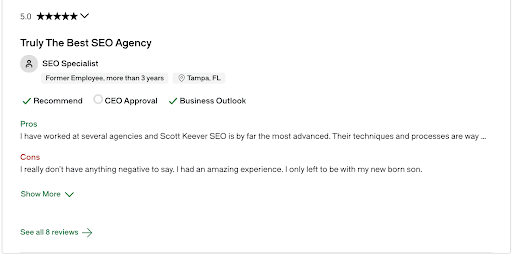
Social Media
- Negative comments on your business page
- Poor review ratings on your social pages or aggregators
- Unaddressed complaints
- Negative media being shared on Facebook feeds or Instagram stories
- Engaging with followers at all times
- Encouraging positive reviews
- Auditing your brand’s social media presence and addressing negative comments
- Proactively publishing positive content not related to sales (e.g, charitable work or testimonials)
- Responding to private messages
Owned Media
- Full Control: You are in total control of owned media. Nobody else can touch it without your permission. Your website, videos, newsletters, and other digital products are yours to shape however you want.
- Showcasing Your Expertise: Owned media lets you position yourself as an expert and convey your experience in solving your customers’ problems. This will help build trust and improve conversions.
- Search Engine Optimization: The more assets you build, the more real estate you occupy on the Google results page. For example, if you rank your social profiles, own website, videos, and industry platform profiles, customers will see those first when they Google your brand. This gives you more control over how people see you on the web.
- Your target audience
- Your brand image goals
- Your customer pain points
- Your brand’s tone of voice
Why Do You Need Online Reputation Management?
- A survey from Trustpilot found internet reputation to be the #1 factor in choosing to do business with a brand or not
- Another Trustpilot survey found that 95% of consumers reported trusting a brand with a positive reputation online
- One survey from Intelius found that 78% of consumers look up information about brands before doing business with them
- That same survey from Intelius found that 74% of customers would not do business with a brand if they discovered a negative reputation about them online
- Control your narrative: The more effort you put into ORM, the more you are in control of what’s said about you online and the less competitors, disgruntled employees, and third parties can hurt you.
- Build trust and credibility: Adobe reports in their study “The Future of Marketing” that 70% of consumers do more business with brands they trust. Trustworthy brands get rewarded with more sales, loyalty, and recommendations to other consumers. That same study continued by stating that consumers interacted the following ways with trusted brands: 67% made more purchases, 63% recommended them to friends, and 42% joined a loyalty program. Trust matters and ORM is how you achieve it.
- Damage control: Companies such as Nestle, Chipotle, and even RyanAir have been decimated by out-of-control damage to their online reputation. Opinions, reviews, and negative experiences are now shared instantly. This only enhances the need for crisis management through internet reputation control and brand image enhancement. Brands need to use ORM to combat negative press, control damage, and address public concerns immediately when a crisis strikes.
Proactive vs. Reactive ORM: What’s the Difference And Which One is Right For You?
What is Proactive ORM?
What Are The Common Types of Proactive ORM?
Creating a Consistent Brand Image
Optimizing Your Website
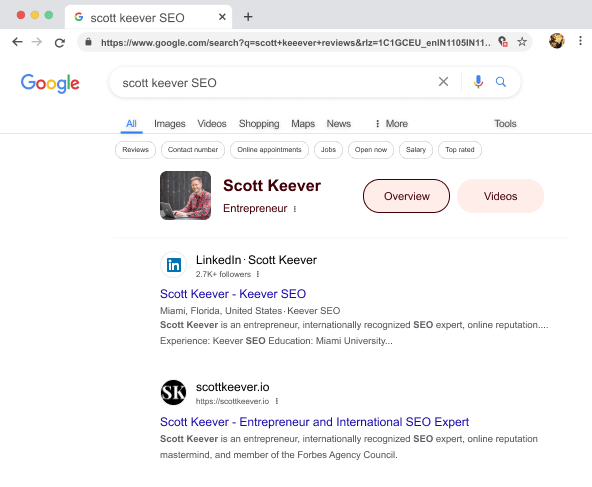

Optimizing Your Social Media Profiles

Claiming All Available Assets
- It enhances visibility
- It protects your brand
- It makes it more difficult for negative press to rank on Page 1 of Google
- It prevents cybersquatting (third parties taking control of your branded sites or profiles)
- It creates a unified brand image

Publishing Positive Press
- Sharing achievements and awards
- Sharing positive case studies
- Publishing new ventures
- Creating thought leadership content for blogs and social platforms
- Creating case studies and testimonials
Implementing schema markup


- It improves your SEO: Using structured data improves your chances of ranking more content on the SERP, giving you more control of your brand image and reducing the chances that negative press ranks on Page 1.
- It improves your business: Ranking on Google with more images, icons, and content in the form of “rich snippets” increases the chances that users will click to your site.
- It improves credibility and trust: Utilizing schema leads to better trust and credibility by confirming your brand message across more platforms. When someone searches your brand online, they’ll see more data displayed on Page 1 saying positive things about you.
- Personal data markup
- Organizational data
- Images
- Review ratings
- News (so news articles appear at the top of the search results)
- Local business data displaying an image, location, and working hours if applicable
What is Reactive Online Reputation Management
- Publishing responses to bad press
- Publishing positive media that improves your image
- Pushing up your social media accounts where you post positive media or responses
- Creating new brand assets to outrank the bad press
- Pushing up your company or personal website where you can address the concerns
- Identifying previous positive press and pushing that to the top of the results to outrank the negativity
How to Repair Your Damaged Reputation Online
- Your company blog or website
- Your social media profiles
- Your YouTube channel or just creating videos for your platforms
- Journalists in your network
- Publications who accept sponsored posts
- Influencers
- Previously satisfied clients
- Forums such as Reddit or quora
- Blog sites like Medium
Reverse Engineer Peers to Discover New PR Content Opportunities


Create an Entity Home
How Can Keever SEO Help Protect Your Online Reputation?
- Bad press from lawsuits, business failure, or divorce
- Trouble with police or mugshots
- Social media attacks
- Losing customers or sponsorships
- Employees losing faith in your business
- Difficulties finding positive media opportunities
- Analyze the crisis: We’ll figure out the source of the crisis, analyze public sentiment, and analyze review scores, search engine rankings, and forum posts to build a plan of action. Once we know what the problem is, we can fix it. It’s like going to the doctor for back pain - once they know the source, they can prescribe the cure.
- Identify positive press opportunities: The next step is to publish as many positive articles as possible on the right outlets to maximize ownership of the results page and push negative articles out of the public eye. We’ve been doing this for 10 years, so we’ve already got a network of journalists and content managers in place ready to accept new media with your good name on it.
- Reverse engineer your peers: My team will get to work analyzing your closest peers and competitors to find opportunities for new outlets we might not be aware of.
- Optimize your existing PR assets: Once we optimize your personal site or company site, social profiles, and review site pages, Google will favor these positive assets over the negative ones and display the information that you want the world to see.
- Leverage our network of websites to build more positive assets: When you’re in crisis, you need the most popular websites to start saying positive things about you to improve your reputation. These ultra “high-authority” sites are the best places to publish good press because they’re so much more visible than smaller, “mom and pop” sites. For example, if I get you published in Forbes, the public is going to see that before they see bad press on a smaller website. Normally, it’s almost impossible to get these publishing opportunities, but since I’ve painstakingly built my network over the years, it’s easy for me.
- Schema markup and technical SEO: My team will implement important structured data across your entire web presence to tie everything together neatly. This will boost all of your assets up and make it easy for Google to display your positive reviews, testimonials, news stories, and company media instead of the bad press.
- SEO campaigns: This is one of the hardest parts of ORM. Once you establish a positive web presence, you need to continually perform SEO and “link building” campaigns to keep “powering up” your positive brand images. By this I mean, you need to consistently publish good press and get other outlets to vouch for your brand image to maintain your positive results in Google and keep the bad results out. If you neglect this, all your hard work could easily be undone.
- Traffic Campaigns: In ORM, you want your positive assets to get more web visitors than your negative ones. It’s simple math. The more visitors an article gets, the more likely it is to rank high in Google. If negative press gets more traffic, it could outrank the positive press. My team will run campaigns that get consistent, high-quality traffic to your positive entities online and boost them over anything negative about you. Once we signal to Google to favor positive news over negative press, Google will rank the good articles over the bad ones. Plain and simple.
Reactive ORM Crisis Management Case Studies - How Keever SEO Helped Save The Reputations of an Actor, Athlete, and Business Mogul
Multi-Billionaire PR Crisis From The Guardian and AP News
- We analyzed the negative press to create a plan of action
- We cataloged existing positive content to see which would be best to boost above the negative press
- Then, we exponentially increased traffic to the positive news to signal to Google to rank it above the damaging content
- Next, we powered up his social profiles and brand assets to push them up the rankings
- We then connected all of his profiles, site, and positive press using schema markup so Google could easily read, understand, and display it
- Finally, we created an SEO campaign to send traffic and links to existing positive assets. Since his positive assets now had more traffic, links, and freshness (Google prefers new content), all of the positive news outranked the negative press
Actor in Crisis Mode Removes Negative Media And Restores His Acting Career
Removing Damaging Content From Sports Websites For a High-Profile Athlete Under Media Scrutiny
- Created a campaign to send a higher number of traffic and links to positive assets, signaling to Google that the positive assets were favorable to the negative ones
- Used our existing network of high-authority sites to begin a PR campaign that resulted in 8 new positive pieces being published by trustworthy sites
- We optimized all of the athlete’s existing assets so that they featured prominently in Google’s results - much higher than they did before
- We acquired several scholarship sites in the athlete’s name to offer $1,000 or more to students. This resulted in high-authority links from colleges and universities as well as positive press that powered up his existing assets
- Finally, we began SEO campaigns to his existing assets such as social media profiles so they outranked the damaging content


